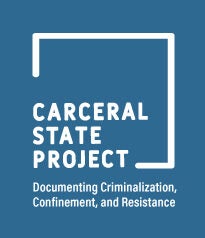Abigail Najar is a senior at the University of Michigan and a researcher for the Policing and Social Justice HistoryLab, an affiliate of the Carceral State Project. During the Winter 2022 semester, she was part of a group of fifteen undergraduate students who created the website Detroit Unaccountable: Police Brutality, Community Activism, and the Limited Impact of Federal Oversight, covering the years from 1994-2014 (the website will go live in 2023). Abigail’s three-person team researched the history of the Detroit Coalition Against Police Brutality (DCAPB) and created the “Protesting Brutality” section of the Detroit Unaccountable website. They received the MacKintosh Undergraduate Research Award from the University of Michigan Library for best team project completed during the 2021-2022 academic year. Abigail’s reflection on the meaning of this work follows:
Before I began working on Detroit Unaccountable, I did not fully understand what it meant to do historical research. I thought it was simply documenting and analyzing historical events. So, coming into this project, I thought that our mission would be to document and analyze instances of police brutality and relevant policies in the city of Detroit. As the project went on, however, I began to realize that these specific instances and policies were just small pieces of an incredibly complex and powerful story. This project is about hundreds of lives cut short, hundreds of traumatized victims, hundreds of wrongfully incarcerated individuals, forgotten movements and activists, systemic corruption, and a city with such a broken justice system that the federal government could not produce real change. Our mission is not just to document, but to tell each victim’s story, to give forgotten activists a permanent place in history, and to force people to recognize the never-ending problem of injustice in Detroit’s justice system with irrefutable evidence.
One of the reasons that led me to change my beliefs towards this project is the sheer amount of instances of police brutality and prosecutorial misconduct my team discovered within just three weeks of the semester. My research team discovered over 30 police killings, over 60 instances of police brutality and misconduct, and at least 14 people who were wrongfully incarcerated, all between the years of 1998 and 2001, all in one city. I immediately realized that what we know about police brutality and prosecutorial misconduct from the media barely scratches the surface of the problem. In our day to day lives, we only hear about big cases, cases that spark protests and outrage. To discover over 100 such cases was a wake-up call. It showed me just how little I knew about police brutality and prosecutorial misconduct, and it showed me how extensive the problem truly is. More important, however, it showed me how unfortunate it is that the true extent of the issue is not already public knowledge. This realization inspired me to fully immerse myself into this project so that the broader public has access to archival documents and educational materials regarding these issues.
As my team and I did research, we learned more and more about the Detroit Coalition Against Police Brutality (DCAPB), an activist group in the city of Detroit whose mission it was to do just that–teach about the almost unimaginable nature of Detroit’s justice system. DCAPB was a small group that worked tirelessly to fight for all of these individuals and to fight for a complete overhaul of the system. The work of DCAPB was central to my team’s research, and without the research conducted at the time by these activists, we would not have been able to complete the work we did. The Citizen Review Panel and the Shoulders Report were two of the most important archival documents our team uncovered, both of which were direct results of DCAPB’s activism. Throughout the late 1990s, members consistently attended Board of Police Commissioners meetings, City Hall meetings, and organized protests and demonstrations. This put so much pressure on the Police Department and city leadership that they allowed the Citizen Review Panel to take place, the findings of which proved that Detroit police had inadequate fatal force policies, access to far too many weapons, and far too little training. Further, much of this pressure was related to a single police officer who killed at least three citizens. DCAPB put so much pressure on the Detroit Police Department and city to investigate this officer that the DPD commissioned an internal review, known as the Shoulders Report, but refused to release its findings to the public or the families of people killed. This report proved that the officer had an violent track record and contained autopsy reports that refuted the official police versions of why all three shootings were “justifiable homicides.” Our group was able to include a redacted version of the Shoulders Report, obtained through a lawsuit filed by the Michigan Citizen newspaper, on the forthcoming website. DCAPB’s role in pressuring the police department to commission these two investigations proves just how important the grassroots activists were and shows that when a small citizens group can get more done than city government itself, something is terribly wrong. This was an incredibly powerful finding because it proved that activism does work, and it is so important to recognize groups that were the driving force for change, rather than the mayor or police chief, who often received credit when change took place.
Further, it is so important to note that DCAPB’s work has, up until the publication of this project, been almost entirely written out of history. I was shocked to learn this fact, and it made me question much of the knowledge I had about how change occurs in this country. In the last decade, this country has seen a massive rise in protests about police brutality, and as of late, we have seen small victories, such as a conviction for George Floyd’s murderer. However, what most people do not realize, and what I did not realize prior to my work on this project, is that without activists working to initiate investigations and pressure prosecutors, it is unlikely that these victories would take place. Learning DCAPB’s role in the small changes that did occur in the city of Detroit led me to this realization and taught me that we should look to activists in our community in our efforts to bring about change. Because of this, my team and I wanted to do our absolute best to help give them a permanent place in history, and by doing so, I hope that we can inspire our leaders to give current activist groups a place in history books, as well.
When people read our website, I want them to not just acknowledge the problem of police brutality and prosecutorial misconduct, but to understand why the problem existed, what was done incorrectly, and that this is still a pressing issue in Detroit today. Most important, however, I want them to know that the best way to achieve change and to begin repairing a broken system is through tireless effort. Without the Detroit Coalition Against Police Brutality, much less progress would have occurred. They made changes without the help of the government and without officials on their side. Their work should serve as a lesson, therefore, that we cannot rely on leaders to fix the problem of police brutality. Instead, we have to demand change ourselves by putting pressure on the police, the prosecutors, and the entire justice system.


